Freshwater for the Future National Initiative: May 2006 Conference held in Quebec
Convening for Action in BC informs “Policies for Sustainable Water Management in Canada”
The Policy Research Initiative, together with 10 federal and non-government partners, recently held a very successful three-day conference titled: Freshwater for the Future: Policies for Sustainable Water Management in Canada. Held at the Gatineau Hilton from May 8 to 10, 2006, the conference attracted nearly 350 participants from all levels of government, academia, non-governmental organizations, and industry.
Addressing a wide range of issues relevant to developing a pan-Canadian freshwater policy for Canada, the participants benefited from the insights of over 100 speakers and panellists, including such prominent Canadians as Peter Pearse, Senator Grafstein, Senator Banks, David Runnalls, the Rt. Hon. Herb Gray, Ralph Pentland, Phil Fontaine, Harry Swain, the Hon. Steve Ashton, Marc Paquin, André Beauchamp , and Beverley Yee.
The conference explored themes such as public-private partnerships, boundary waters, valuing and allocating water, governance issues, encouraging innovation, the particular challenges faced by First Nations and other small communities, dealing with pollution, and the science-policy interface.
Five major questions were addressed throughout this conference: What has changed in the last 20 years? What is the Federal role? How can we achieve greater policy coherence? Are our policies robust enough to cope with climate change? and, Do our policies encourage technological innovation?

Panel Session on Alternatives to Water Supply and Water Demand Management
Water supply management is still the dominant approach to water resources management in Canada. The panel session focussed on non-conventional approaches.
According to Cate Soroczan who chaired the session, “Instead of looking at water as a product, alternative approaches to water management consider water as one  means for providing a service – and not always the only or even the best one. This session explored various perspectives on water management: residential, municipal, planning, agricultural, and industrial. We asked questions such as: which circumstances will loosen the tie between water management and water supply? To what extent could alternative approaches to water management help us adapt to climate change?”
means for providing a service – and not always the only or even the best one. This session explored various perspectives on water management: residential, municipal, planning, agricultural, and industrial. We asked questions such as: which circumstances will loosen the tie between water management and water supply? To what extent could alternative approaches to water management help us adapt to climate change?”
The members of the panel comprised:
- Hans Schreier, University of British Columbia
- David Brooks, Friends of the Earth, Canada
- Paul Kay, University of Waterloo
- Glen Pleasance, Durham Region
- Kim Stephens, Water Sustainability Action Plan for British Columbia
- Moataz Shalabi, Hamburg University of Technology
Hans Schreier – Virtual Water and the Water Footprint
The concept of Virtual Water should be considered in all water balance calculations because it is becoming evident that some water scarce countries will likely import food that is water intensive to produce. Virtual water is defined as the water that is needed to produce food or a commodity. It is measured in m3 of water /ton of crop or product based on crop water requirement, the yield and the amount of water used in processing the crop.
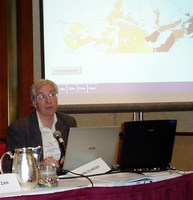 This concept has been applied globally by UNESCO to determine water balances for most of the countries in the world. Canada has the potential to become a virtual water exporter but as water resources became scare decisions need to be made on how to reorganize food production. Water demanding crops should be grown in areas with surplus water and water efficient crops should be grown in dry areas of Canada. The presentation documented the relevance of virtual water in policy decision making and in determining trade-offs between different water users.
This concept has been applied globally by UNESCO to determine water balances for most of the countries in the world. Canada has the potential to become a virtual water exporter but as water resources became scare decisions need to be made on how to reorganize food production. Water demanding crops should be grown in areas with surplus water and water efficient crops should be grown in dry areas of Canada. The presentation documented the relevance of virtual water in policy decision making and in determining trade-offs between different water users.
David Brooks – What the soft path can and what it cannot do?
Water soft paths are a new conceptual approach to planning for water management. They are also an analytical method for determining, and for limiting, the amount of water to be withdrawn in the future. This presentation reviewed the concept of water soft paths, and contrast it to supply management and demand management. It then went on to describe Friends of the Earth’s current research project to explore water soft paths at the provincial (Ontario), watershed (Nova Scotia) and urban (British Columbia) scales.
To Learn More:
For more, click on Presentation by David Brooks on “What the soft path can and what it cannot do?”
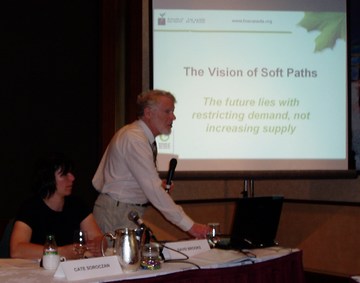
Paul Kay – Needs identified from application of the soft path approach to industry in Ontario
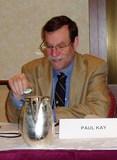 The soft path approach begins with establishment of baseline data on water use, creates scenarios of desirable and feasible futures, and identifies opportunities for obtaining them. Examples from several industrial sectors in Ontario were used to illustrate the frustrations due to incomplete and inconsistent data, and the contribution possible from the soft path. Policy needs include standardization of indicators, evaluation of economic goals from environmental considerations, and a central repository for water data on a regular basis.
The soft path approach begins with establishment of baseline data on water use, creates scenarios of desirable and feasible futures, and identifies opportunities for obtaining them. Examples from several industrial sectors in Ontario were used to illustrate the frustrations due to incomplete and inconsistent data, and the contribution possible from the soft path. Policy needs include standardization of indicators, evaluation of economic goals from environmental considerations, and a central repository for water data on a regular basis.
To Learn More:
For more, cllick on Presentation by Paul Kay on “Needs identified from application of the soft path approach to industry in Ontario”
Glen Pleasance – The Micro and Macro of Municipal Water Efficiency in Canada
This presentation will discuss specific municipal water efficiency projects such as Durham Region’s (ON.) Water and Energy Efficient Demonstration Community and  others. The Durham project is an attempt to identify cost-effective ways of making new homes more water efficient. Discussion included how and why water efficiency is an important component of municipal infrastructure planning and the diverse spectrum of water efficiency efforts. The macro component looks at Federal and Provincial policies and legislation that are beneficial or detrimental to municipal water efficiency efforts. It also looks at potential policies that would enhance or further municipal water efficiency efforts.
others. The Durham project is an attempt to identify cost-effective ways of making new homes more water efficient. Discussion included how and why water efficiency is an important component of municipal infrastructure planning and the diverse spectrum of water efficiency efforts. The macro component looks at Federal and Provincial policies and legislation that are beneficial or detrimental to municipal water efficiency efforts. It also looks at potential policies that would enhance or further municipal water efficiency efforts.
To Learn More:
For more, click on Presentation by Glen Pleasance on “The Micro and Macro of Municipal Water Efficiency in Canada”
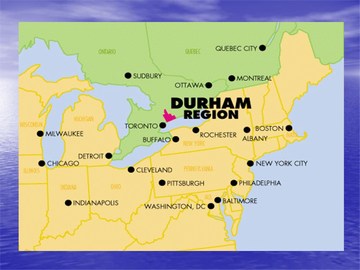
Kim Stephens – Convening for Action in British Columbia: Moving Towards the Water Balance Way-of-Thinking and Acting
The Water Sustainability Action Plan for British Columbia provides a partnership umbrella for an array of on-the-ground initiatives that promote a ‘water-centric’ approach to community planning. The Action Plan comprises inter-connected  program elements that give local governments and practitioners the tools and experience to do things differently. The over-arching goal is to advance a water balance way-of-thinking and acting. The emphasis is on educating stakeholders regarding a ‘design with nature’ approach to land development. Early success in changing the way we manage rainwater runoff has created the momentum to move beyond rainwater management to embrace all components of the water cycle through integrated water management.
program elements that give local governments and practitioners the tools and experience to do things differently. The over-arching goal is to advance a water balance way-of-thinking and acting. The emphasis is on educating stakeholders regarding a ‘design with nature’ approach to land development. Early success in changing the way we manage rainwater runoff has created the momentum to move beyond rainwater management to embrace all components of the water cycle through integrated water management.
To Learn More:
For more, click on Presentation by Kim Stephens on “Convening for Action in British Columbia: Moving Towards the Water Balance Way-of-Thinking and Acting”
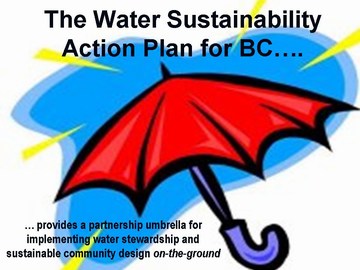
Moataz Shalabi – Innovative Sanitation Concept – The German Experience
Central sewerage systems not only consume high amounts of freshwater but also dilute nutrients (phosphorus, nitrogen) and organic substances to such an extent that only small part can be reclaimed. The nutrients are washed away with purified wastewater and are emitted to rivers and seas where they are extremely harmful (eutrophication). The purpose of this presentation was to suggest new innovative sanitation concepts saving both energy and water and keep the soil fertile. Practical examples from Germany were shown.
To Learn More:
For more, click on Presentation by Moatiz Shalabi on “Innovative Sanitation Concept – The German Experience”
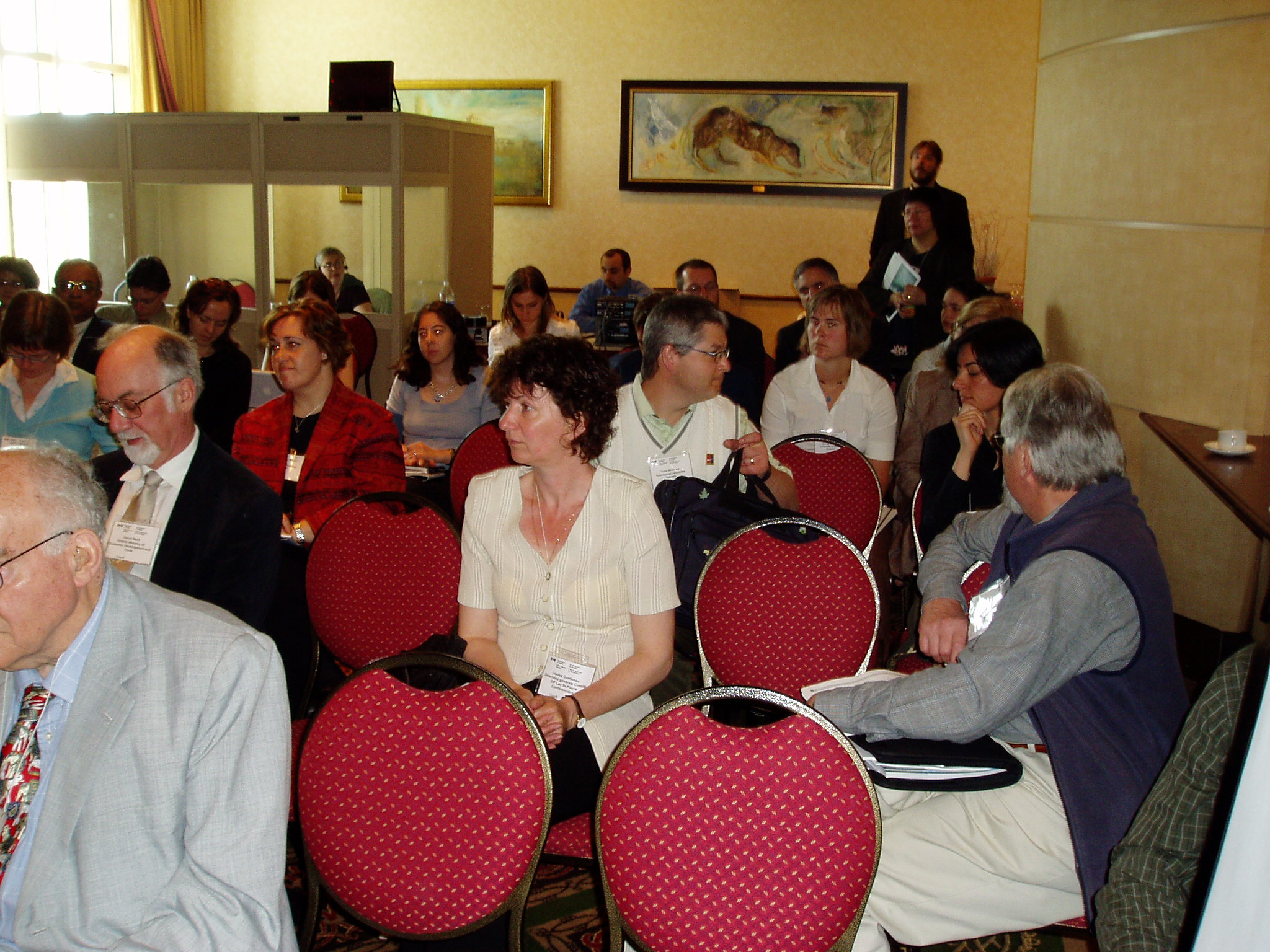
Oliver Brandes, POLIS Project on Ecological Governance at University of Victoria, is standing at the back of the room


